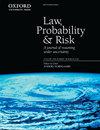知识产权在可持续金融、审慎银行和资本充足率监管中的现代作用
IF 1.4
4区 社会学
Q1 LAW
引用次数: 0
摘要
技术创新和资本主义迅速改变了我们的星球,提高了我们的生活水平,同时使环境恶化。人类创造的技术进步对自然环境最显著的影响是气候变化。迫切需要各种各样的创新来解决全球范围内的问题。以市场为基础的可持续发展的多个方面之一是知识产权在激励新知识和财政监管政策方面所起的作用。银行如何向创新型企业提供信贷,同时降低自身风险,是一项长期和短期的挑战。银行审慎监管尚未充分考虑无形资产和知识产权在商业和经济中的现代作用,以及作为银行资产的作用。通过对审慎金融监管对无形资产,特别是专利、商标和外观设计等正式注册的知识产权的作用的新见解,本章对有关可持续发展目标9 (SDG 9)的跨学科文献做出了原创性贡献,以促进包容和可持续的工业化,同时促进创新。本文章由计算机程序翻译,如有差异,请以英文原文为准。
A Modern Role for Intellectual Property Rights in Sustainable Finance, Prudential Banking and Capital Adequacy Regulation
Technological innovation and capitalism have rapidly transformed our planet, raising our living standards while degrading the environment. The most striking impact of the advance of human-created technological progress on the natural environment is climate change. There is an urgent need for a wide variety of innovations to solve problems on a global scale. One of the multi-faceted aspects of sustainable development in a market-based context is the role that intellectual property rights (IPRs) play in incentivizing new knowledge and fiscal regulatory policy. How banks provide innovation firms with credit, while mitigating their own risk, is an ongoing challenge with both short- and long-term implications. Prudential banking regulation has yet to fully consider the modern role of intangible assets and IPRs in business and the economy and as bank assets. With new insights regarding the role of prudential financial regulation treatment of intangibles and especially IPRs such as patents, trade marks and designs that are formally registered, this chapter makes an original contribution to the interdisciplinary literature regarding Sustainable Development Goal 9 (SDG 9) to promote inclusive and sustainable industrialization while fostering innovation.
求助全文
通过发布文献求助,成功后即可免费获取论文全文。
去求助
来源期刊

Law Probability & Risk
MATHEMATICSSTATISTICS & PROBABILITY&-STATISTICS & PROBABILITY
CiteScore
2.10
自引率
28.60%
发文量
8
期刊介绍:
Law, Probability & Risk is a fully refereed journal which publishes papers dealing with topics on the interface of law and probabilistic reasoning. These are interpreted broadly to include aspects relevant to the interpretation of scientific evidence, the assessment of uncertainty and the assessment of risk. The readership includes academic lawyers, mathematicians, statisticians and social scientists with interests in quantitative reasoning.
The primary objective of the journal is to cover issues in law, which have a scientific element, with an emphasis on statistical and probabilistic issues and the assessment of risk.
Examples of topics which may be covered include communications law, computers and the law, environmental law, law and medicine, regulatory law for science and technology, identification problems (such as DNA but including other materials), sampling issues (drugs, computer pornography, fraud), offender profiling, credit scoring, risk assessment, the role of statistics and probability in drafting legislation, the assessment of competing theories of evidence (possibly with a view to forming an optimal combination of them). In addition, a whole new area is emerging in the application of computers to medicine and other safety-critical areas. New legislation is required to define the responsibility of computer experts who develop software for tackling these safety-critical problems.
 求助内容:
求助内容: 应助结果提醒方式:
应助结果提醒方式:


